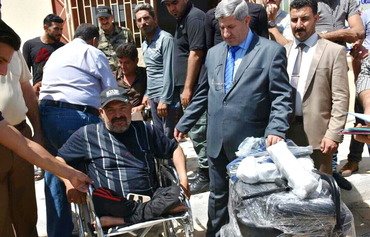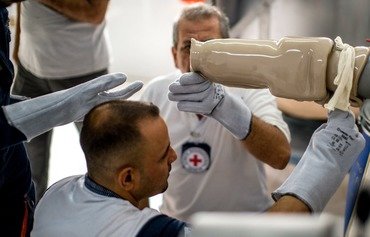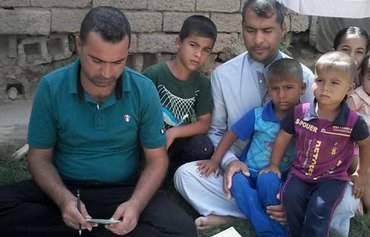The Iraqi government will need broad-based support from civil society and international organisations to care for the thousands of wounded or disabled victims of the "Islamic State of Iraq and Syria" (ISIS), officials told Diyaruna.
Government support alone will not be sufficient to care for those wounded or disabled by ISIS or during the battles to oust the group from Iraq, they said.
The Ministry of Labour and Social Affairs has called on all government agencies and civil society organisations to contribute to providing aid and assistance to disabled individuals, ministry spokesman Ammar Muneim told Diyaruna.
"The ministry now bears the heaviest burden in caring for them after the elimination of ISIS," he said, and needs help to address the lingering ill-effects of the group's incursion.
The ministry is acting pursuant to Law No. 38 of 2013 to provide care to people with disabilities and special needs, eliminate discrimination against them, and help them find jobs, Muneim said.
It has been working on a plan to dispense a monthly stipend to each person who cares for a disabled individual on a full-time basis in all Iraqi provinces, he said.
"A new batch of salaries has been disbursed to caretakers in Ninawa province following its liberation from ISIS," he said.
Treatment outside the country
The Iraqi government, in co-operation with civil society organisations, has been sending many wounded and disabled soldiers abroad to receive treatment.
"The number of wounded or disabled still far exceeds the amount of care and medical support that the government and humanitarian organisations are able to provide," said Fadel al-Gharawi of Iraq's Independent High Commission for Human Rights.
Kuwait is slated to host an international donor conference to raise funds for the reconstruction of Iraq, post-ISIS, from February 12th to 14th.
This will be an important opportunity to generate greater international support for the care of the war-wounded and disabled, al-Gharawi told Diyaruna.
"International organisations can help Iraq address the psychological and physical harm suffered by war victims and provide real humanitarian aid to affected areas and citizens," he said.
This could be provided as in-kind support as well as financial assistance, he said.
There are no accurate figures that show how many people were wounded or disabled in the war against ISIS, he said, noting that this presents an obstacle.
These figures are necessary to build a database that can be used to provide support to these people, he added, noting that security agencies have so far limited their work to documenting the number of deaths in combat.
Demands for greater support
According to Anbar's local government, the support and assistance provided to victims of ISIS and those who were disabled as a result of the group's actions remains below the desired level.
The Ministry of Labour and Social Affairs has been disbursing monthly stipends to the disabled and conducting training workshops for them every now and then, Anbar provincial council member Athal al-Fahdawi told Diyaruna.
But this does not meet the real need of this segment of the population, he said.
"Many of the disabled and wounded in Anbar found themselves homeless after the war as their residential neighbourhoods were destroyed or damaged in the war," he told Diyaruna.
The situation is very complicated, al-Fahdawi said, calling for "direct government intervention and more support from the relevant authorities".
The stipends disbursed to caretakers of disabled persons registered in the Ministry of Labour's database do not exceed 170,000 Iraqi dinars ($144) per month, according to the Ministry of Labour and Social Affairs.

![Prime Minister Haider al-Abbadi visits a man who was wounded in the battles to oust the 'Islamic State of Iraq and Syria' at a Baghdad hospital. [Photo courtesy of the Office of the Prime Minister]](/cnmi_di/images/2018/01/24/11101-Iraq-Baghdad-visit-600_384.jpg)






